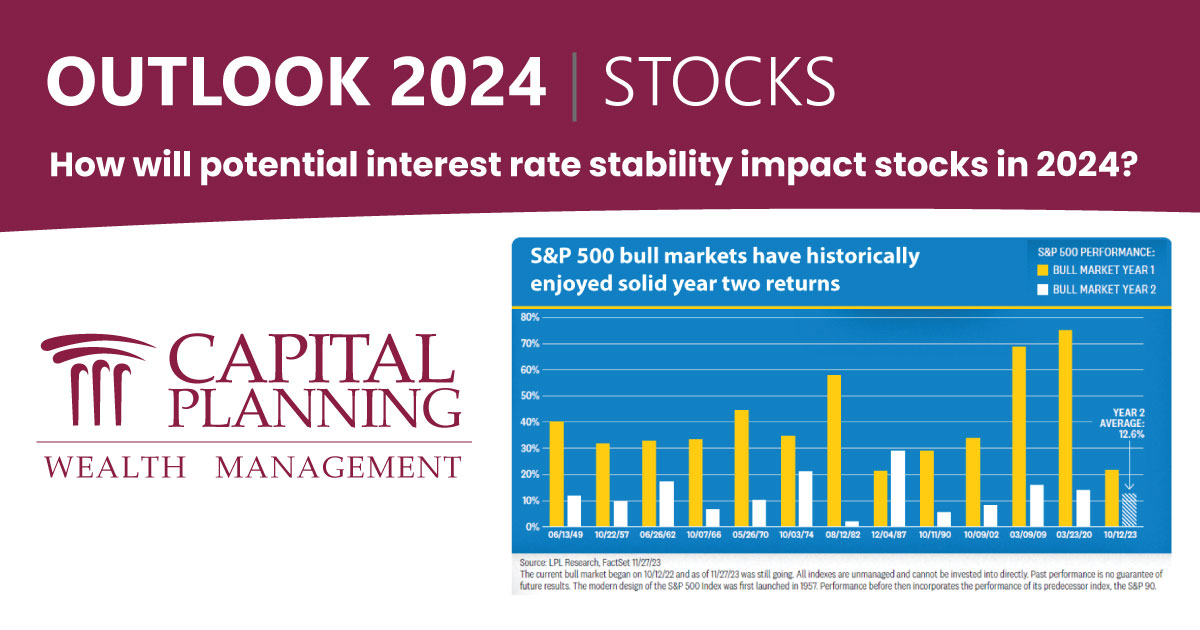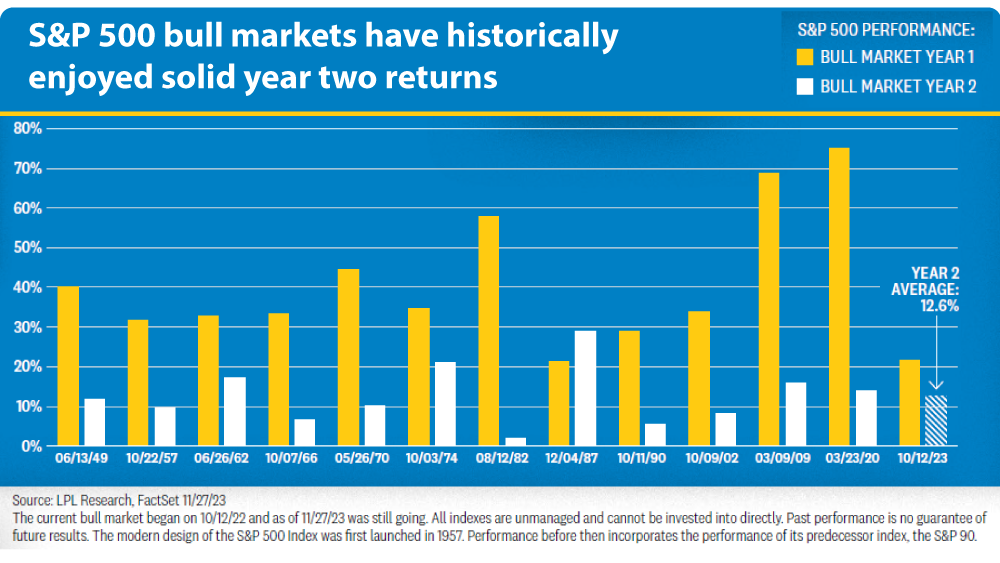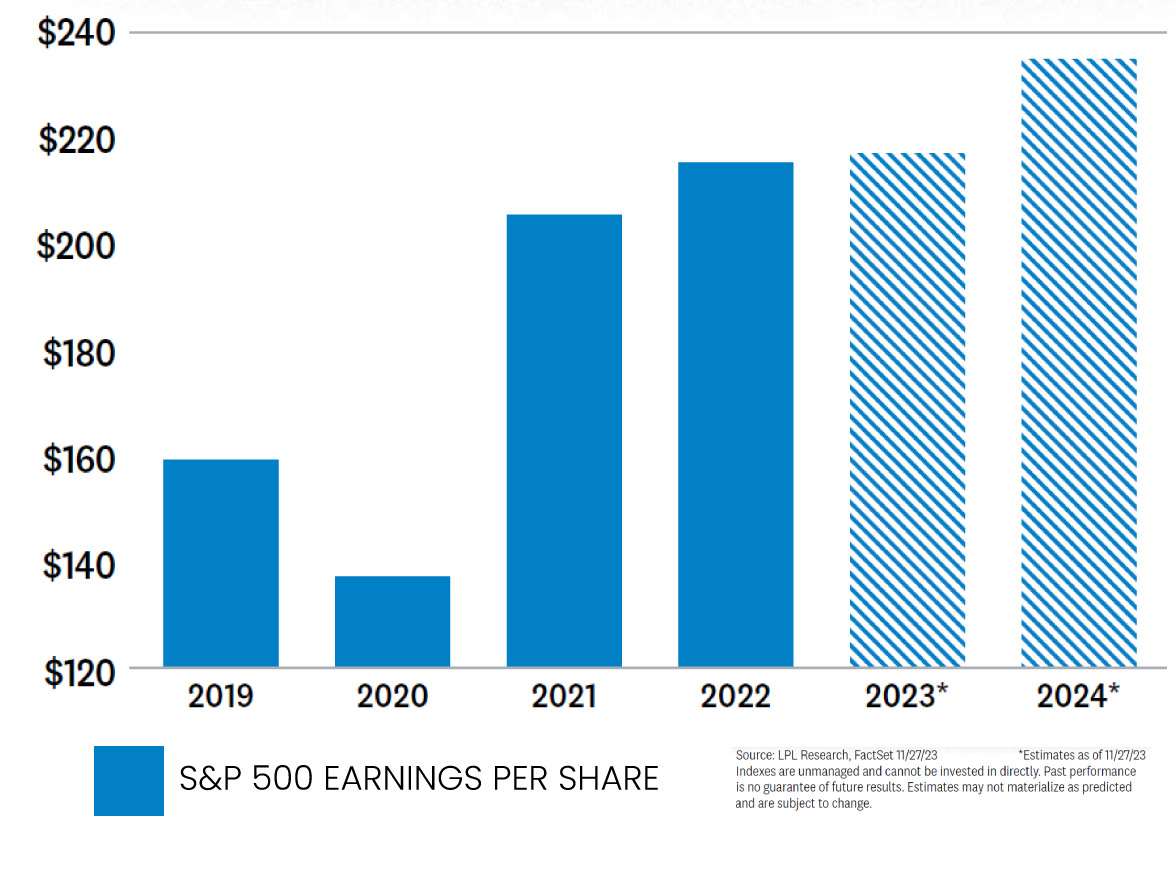
Following the Fed’s aggressive rate-hiking campaign to combat the massive inflation surge, the stock market will become one where participants are focused on interest rate stability. We expect inflation will come down further, and as it does, interest rate stabilization should help support stock valuations, just as some of the biggest headwinds for corporate America begin to reverse.
ECONOMIC CYCLE
This one has been unique, to put it mildly given the highly uneven recovery in recent years coming out of the pandemic. As previously discussed, a mild, short-lived recession in 2024, followed by recovery later in the year is our basecase scenario. The uncertainty that comes with anticipating a recession may limit stock gains as 2024 begins. But it could bolster investor sentiment midyear, as is typical coming out of an economic trough (the lowest part and turning point of an economic cycle). Keep in mind, the market’s reaction to the economic cycle in 2024 could be muted, given that stocks essentially priced in a recession in 2022 following the surge in growth of the postpandemic economy.
BULL MARKET CYCLE
The young age of this bull market historically points to solid gains ahead. The start of the current bull market (began in Oct 2022) has been unspectacular. Through the first 12 months, the S&P 500 has gained 21.6% (dividends excluded), compared to the historical average of approximately 40% over a similar time frame. The tepid rebound off the market low was partly due to the shallow bear market in 2022 and atypically high valuations at that time that ultimately left less upside in a rebound.
Certainly, sticky inflation and rising interest rates also played roles in slowing this bull, one in which banks. and small caps have underperformed (+1.2% and +4.3% respectively) based on the S&P 500 Banks and Russell 2000 indexes. As the next 12 months of the bull gets underway, market history tells us solid gains may lie ahead. Of the 12 such periods since 1950, the S&P 500 has gained an average of 12.6% and was positive every time. A gain of this magnitude seems reasonable given the potential for support from the Fed as inflation falls.
RATE CYCLE
The current interest rate cycle could be impactful when it comes to stocks. With inflation still elevated, high rates remain a threat to the economy and the stock market. Stocks and bond yields became increasingly negatively correlated (moving in opposite directions) in 2023. While that wasn’t great news for the stock market, it does mean interest rates could present an opportunity, as LPL Research believes the 10-year Treasury yield could be less volatile in 2024.

EARNINGS CYCLE
The earnings cycle is entering its sweet spot. With the earnings recession now over, earnings are moving into a period of growth. Analysts underestimated the economy’s resilience and corporate America’s ability to generate revenue and control costs amid intense cost pressures in 2023. Third quarter earnings season continued the favorable trend. Earnings came in 7.7% above estimates on average, while estimates for the subsequent four quarters have held up relatively well, falling just 1.4% during the reporting period.
The bar has been raised for 2024, but if we get only a mild recession as we expect and inflation continues to fall, corporate America should be able to continue its estimate-beating ways. Our 2024 S&P 500 earnings per share (EPS) forecast is $235 per share, up from our prior estimate of $230. The new estimate represents only about 7% earnings growth from the current 2023 consensus S&P 500 EPS estimate of $219. Beyond economic growth, how companies manage waning pricing power as inflation falls is key to the earnings outlook. Reversals of 2023 earnings declines by the healthcare and the natural resource sectors, along with increased earnings growth in the technology sector, will help drive a turnaround in overall earnings.

OVERALL FORECAST
Bearing all this in mind, we anticipate solid but not spectacular stock market returns in 2024. The average return for the stock market over the long term is near 10%, so a gain near average would be good. In 2024, returns may fall less than average. While earnings growth will likely help push stocks higher in 2024, the contribution from valuations may be more limited. Stocks appreciate in value primarily in two ways—either earnings grow, or valuations become richer. The good news is that stocks can move higher in the coming year without much help from valuations—a different story from the past two years.
Stay tuned for more from our 2024 Outlook over the coming weeks. Happy New Year!
The opinions, statements and forecasts presented herein are general information only and are not intended to provide specific investment advice or recommendations for any individual. It does not take into account the specific investment objectives, tax and financial condition, or particular needs of any specific person. There is no assurance that the strategies or techniques discussed are suitable for all investors or will be successful. To determine which investment(s) may be appropriate for you, please consult your financial professional prior to investing. Any forward-looking statements including the economic forecasts herein may not develop as predicted and are subject to change based on future market and other conditions. All performance referenced is historical and is no guarantee of future results.
References to markets, asset classes, and sectors are generally regarding the corresponding market index. Indexes are unmanaged statistical composites and cannot be invested into directly. Index performance is not indicative of the performance of any investment and does not reflect fees, expenses, or sales charges. All performance referenced is historical and is no guarantee of future results. Alternative investments may not be suitable for all investors and should be considered as an investment for the risk capital portion of the investor’s portfolio. The strategies employed in the management of alternative investments may accelerate the velocity of potential losses. Event driven strategies, such as merger arbitrage, consist of buying shares of the target company in a proposed merger and fully or partially hedging the exposure to the acquirer by shorting the stock of the acquiring company or other means. This strategy involves significant risk as events may not occur as planned and disruptions to a planned merger may result in significant loss to a hedged position. Any company names noted herein are for educational purposes only and not an indication of trading intent or a solicitation of their products or services. LPL Financial doesn’t provide research on individual equities. All index data from FactSet. All information is believed to be from reliable sources; however, LPL Financial makes no representation as to its completeness or accuracy.
GENERAL RISK DISCLOSURES
Investing involves risks including possible loss of principal. No investment strategy or risk management technique can guarantee return or eliminate risk in all market environments. There is no guarantee that a diversified portfolio will enhance overall returns or outperform a non-diversified portfolio. Diversification does not protect against market risk. Investing in foreign and emerging markets debt or securities involves special additional risks. These risks include, but are not limited to, currency risk, geopolitical risk, and risk associated with varying accounting standards. Investing in emerging markets may accentuate these risks.
Many people are curious to understand the potential tax benefits available to them. Questions such as “Is a 529 plan right for me and my goals?” are common, and at Capital Planning, we’ll be happy to guide you on this and any other questions you have.
We can work with you to conduct an analysis of funding needs, and provide recommendations as to investment allocation, ultimately helping you to select the right investments for your goals.
Book a discovery meeting today and speak with one of our advisors about independent financial planning with purpose, so you can focus on enjoying life.